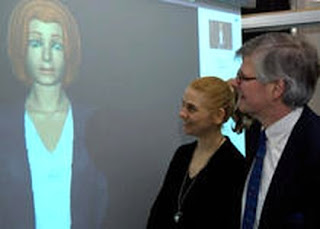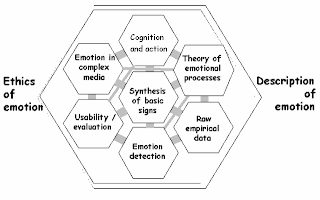
GRETA - an embodied conversational agent. Looking on are Prof Roddy Cowie of Queen's and Prof Maja Pantic from the University of Twente in Holland who is also a Reader in Imperial College London | A computer system that can carry on a discussion with a human being by reacting to signals such as tone of voice and facial expression, is being developed by an international team including Queen’s University Belfast.
Known as SEMAINE, the project will build a Sensitive Artificial Listener (SAL) system, which will perceive a human user’s facial expression, gaze, and voice and then engage with the user. When engaging with a human, the SAL will be able to adapt its own performance and pursue different actions, depending on the non-verbal behaviour of the user. |
SEMAINE is led by DFKI, the German centre for research on Artificial Intelligence: the other partners are Imperial College, London, the University of Paris 8, the University of Twente in Holland, and the Technical University of Munich. The European Commission awarded it a grant of €2.75 million after it was ranked first out of 143 bids for medium-sized projects in the area of cognitive systems and robotics.

Emotion-oriented computing is a broad research area involving many disciplines. The EU-funded network of excellence HUMAINE is currently making a co-ordinated effort to come to a shared understanding of the issues involved, and to propose exemplary research methods in the various areas. This overview page presents a proposed “map” of the research area, distinguishing core technologies from application-oriented and psychologically oriented work. Current research issues in the various areas are briefly outlined, and references for further reading are given. | Professor Roddy Cowie, from the School of Psychology, leads the team at Queen’s. He said: “A basic feature of human communication is that it is coloured by emotion. When we talk to another person, the words are carried on an undercurrent of signs that show them what attracts us, what bores us and so on. The fact that computers do not currently do this is one of the main reasons why communicating with them is so unlike interacting with a human. It is also one of the reasons we can find them so frustrating,” said Professor Cowie.
“SEMAINE and projects like it will change the way people interact with technology. They mean that you will be talking to your computer in 20 years time. |
When you do, pause for a minute, and remember that the human sciences at Queen’s helped to lay the groundwork.
“These new developments depend on connecting technology to the relevant understanding of people, and it is recognised worldwide that we have a distinctive strength in bringing psychology, linguistics and ethics to bear on the process of developing the new systems.”
SEMAINE follows on from another project, entitled HUMAINE, which was led by Professor Cowie. The HUMAINE Project (Human-Machine Interaction Network on Emotion) received €4.95 million to develop interfaces that let humans use computers in a more natural way. In 2006 it won the “Grand Prize” for the best Information Society Technology Project website. HUMAINE continues in the form of a world-wide organisation for emotion-oriented computing, the HUMAINE Association (
emotion-research.net/ ), of which Professor Cowie is president.
Professor Cowie added: “Today when we use technology we adopt a style of communication that suits the machine. Through projects like HUMAINE, SEMAINE, and others linked to them, we will develop technology that will eventually communicate in ways that suit human beings.”
Ends
SEMAINE stands for Sustained Emotionally coloured Machine-human Interaction using
Nonverbal Expression.
Further information on the HUMAINE project, can be found by clicking on the following link which has been created to help provide background information for journalists:
cordis.europa.eu/ictresultsFor media enquiries please contact: Lisa Mitchell, Press Officer, +44 (0)28 9097 5384, Mob: 07814 422 572,
lisa.mitchell@qub.ac.uk Web:
Queen's University BelfastTags:
Sensitive Artificial Listener and
Human-Machine Interaction Network on Emotion or
Queen's University Belfast












